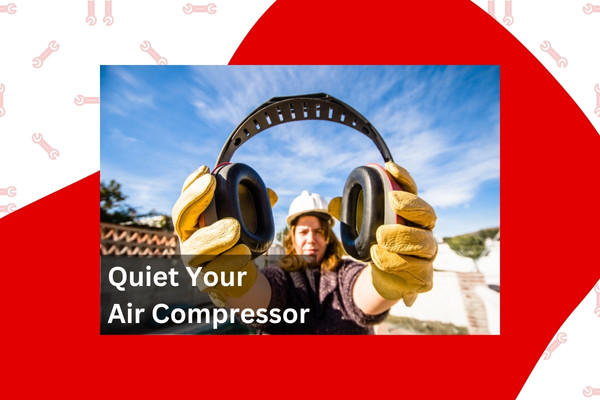
When I worked at a bike shop in college, we had a compressor that sat in a closet. Anytime it came on, we had to stop talking and wait for it to cut off. This was fine, except when we were trying to communicate with a customer.
We got a new shop manager, and the first thing he did was to move the air compressor into a room 20 feet away and soundproof everything around it. It wasn’t long before we forgot there was an air compressor in the shop.
But how do you silence an air compressor? There are a dozen ways to do it, but each method revolves around one of these core principles of sound reduction.
- Wrap the motor
- Increase the Distance between humans and the compressor
- Use a muffler to cover the air intake
- Block the compressor with building materials
- Move the intake.
- Purchase an Oil-filled Compressor
With these, your compression should be quiet.
Or, ultimately, you can just purchase the quietest air compressor on the market
If you are running 2-3 compressors in a single shop, you can end up with quite the noise problem. Here are incredible tips to make your air compressor quieter.
Jump To Air Compressor Quieting Tips
Air Compressors – How Loud Is Too Loud?
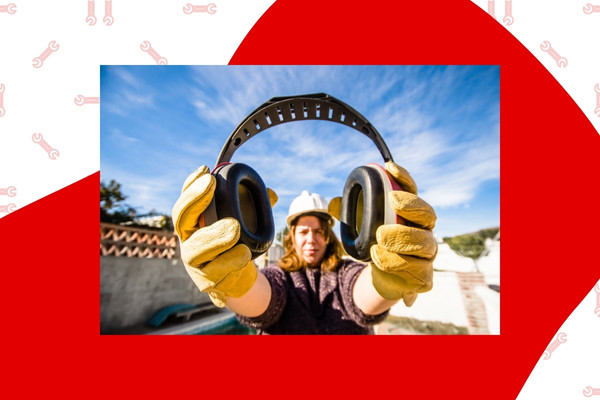
Air compressors are loud. Quiet air compressors will create about 40 decibels of noise. Large, 220v, 2-stage compressors can create up to 90 db.
Keep in mind that most devices will create between 55-65 decibels of noise, so an air compressor with 40 decibels is on the quiet side of the sound spectrum.
For reference, a typical vacuum cleaner has anywhere between 50-85 decibels. Lawnmowers create 90 decibels. OSHA sets legal limits on workplace noise volume. Their limits require workers to only be exposed to a permissible exposure limit (PEL) of 90dBA for an 8-hour day for all workers.
Noise Reference Chart
| Equipment | Noise |
| Refrigerator | 40 |
| Dishwasher | 70 |
| Gas powered Lawnmower | 90 |
| Standing near Sirens | 120 |
If we want to reference noise levels that can cause permanent hearing damage, any noise level over 70 dB, can cause hearing damage over a prolonged period of time. Airplanes taking off from the ground create 140 decibels of noise which could immediately impair hearing ability over time. In fact, the continuous use of devices between 80-90 decibels might eventually damage the cochlear ear hair.
So if you are working in a garage next to an air compressor that is clattering away all day, you could experience permanent hearing loss.
Why Are Air Compression So Loud?
An Air compressor creates noise through multiple moving parts. The loudest part of an air compressor is the sliding piston that rapidly compresses air. Just as with a vehicle, it is this piston that creates the bulk of the noise (in a car, it is the explosions in the cylinder that create the noise).
Here are other elements that affect the air compressor’s noise level.
Gas Powered Engine
Gas-powered compressors make the loudest noise compared to electric compressors. The gas engine creates the bulk of this noise from the muffler. Assuming that the compressor is mounted well, and has no loose parts, your greatest noise reduction will be realized by adding a larger muffler.
Adding a larger muffler will decrease the power of the engine, and may create a hard starting condition in colder weather. However, when you need a quieter job site, a bigger muffler is the easiest fix.
This tip can also come in handy if you are using a generator to power your air compressor.
Friction
Friction also determines the amount of noise from your compressor. You can decrease friction by choosing an oil-filled compressor and ensuring that the oil is filled and changed on a regular basis. The oil-filled compressors are an excellent improvement over the oilless compressors that rely on a thin layer of teflon to reduce friction and thereby reduce noise.
Granted, an oil-filled compressor is larger, heavier and will cost at lease 4 times more than an oil-less compressor. However, they have the advantage of being quieter.
Size And Capacity of Compressor
Your air compressor’s size and capacity also make a huge difference if you’re looking for a quieter option. Pistons on low capacity inflators tend to run at a higher rpm and rapidly heats your compressor’s interior. This process increases the noise from both friction and compression.
In some ways, larger, belt-driven compressors tend to be quieter.
That said, so how do you make your air compressor quieter? Here are 11 ideas.
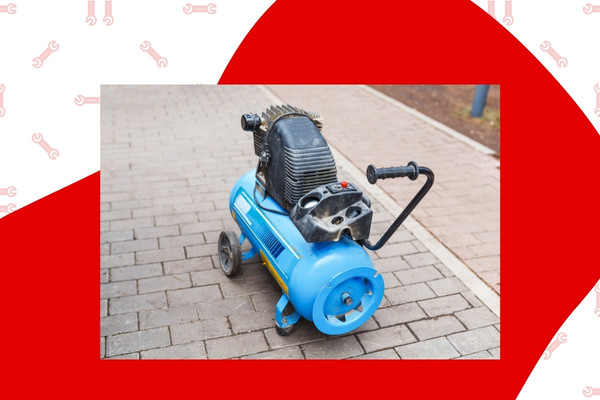
How To Make An Air Compressor Quiet
Here are the best ways to make an air compressor quieter:
- Add A Rubber Mat
- Cover The Compressor Motor
- Increase The Distance Between The Compressor And The Humans
- Place The Compressor In A Soundproof Box
- Use a Muffler To Cover the Air Compressor Intake
- Use Sound Blankets To Quiet The Noise
- Change The Position Of Air Intake
- Add Rubber Grommets To The Motor
- Check Lubrication Levels
- Tighten Loose Screws
Add A Rubber Mat
Most compressors touch the ground with either metal or plastic wheels. These key vibration points can add to the noise a compressor creates.
Those vibrations can work their way up the compressor and create additional vibrations and noise throughout the entire unit.
We can start deadening this noise by investing in industrial-grade rubber mats that can absorb this vibration.
Cover The Compressor Motor

You have to be careful when covering a motor, as it needs room to breathe. Generally, you cannot apply the material directly to a motor, especially not to the fins of an air compressor.
Choking off the compressor by applying material directly to it will cause it to overheat.
However, you can cover the motor with industrial acoustic covers, or build a small box that is lined with sound-reducing material such as a sound-deadening mat to cut down on the noise.
In a way, you could create a small tent or a small wooden box lined with sound-deadening material for your air compressor. The key thing is that you also need to leave a hole in this box to allow air to be drawn in by the air intake valve. This air hole should also allow for sufficient ventilation.
Your air compressor may have some Have you ever covered your hot water heater with sound-reducing material? That’s just the same principle we’ll apply to the air compressor. Here, we’ll use a sound-deadening mat. Sounds-deadening mats are designed to reduce sound effects.
You can get them from an online store or on Amazon if you’re ready to throw in a little money. Make sure you choose a model with enough sheets to cover the entire motor of your air compressor.
Increase The Distance Between The Compressor And The Humans
If you stay in the same room or near your air compression, you can expect to receive the full brunt of the volume.
This is where the inverse square law comes in handy. For every doubling of distance, the noise of the compressor will drop by 6 decibels.
One of the cheapest ways that you can drop the volume of the compressor is by increasing the distance between the worksite and the compressor.
Buy a longer hose, and move the compressor away from where you are working. Moving the compressor from 10 feet to 20 feet away can drop the sound by 6 decibels. In a building, moving the compressor away from where the employees are working can help improve their hearing.
Place The Compressor In A Soundproof Enclosure

Similar to our discussion above about building a tent of soundproofing material, many folks build a small, wooden plywood soundproof box lined with soundproofing material. Foamboard (especially acoustic foam) and acoustic panels work great for noise absorption inside the box. If you don’t mind the added weight, some Type X Fire-rated sheetrock works wonders as well for noise cancellation.
These boxes need to have a couple of 1-inch ventilation holes added to them to allow for heat dissipation and should be about 6 inches larger than the compressor on all sides.
The nice thing about a plywood box is that you can store items on top of it, making this a good option for small shops where space is at a premium.
Sealing gaps and cracks (except for the ventilation hole) is key to making these soundproof enclosures work.
Use Soundproofing Blankets To Quiet The Noise
I love sound blankets because they offer a lot of sound dampening for a very little price. These are especially great for those of you who can move the compressor into a closet. Sound blankets can then be hung around the compressor in the closet and they work great as an extra layer of sound deadening. If you can’t afford a more soundproof door, a soundproofing blanket across the door will help cut down on sound.
Sound blankets are so good, that when we had a new baby, I hung one over the door between the garage and the house to help isolate garage noises from our tiny 3-bedroom house where the baby was sleeping.
Insulation is another great option. While all contractor-grade insulation provides some sound-deadening benefits, the greatest soundproofing is achieved from soundproofing insulation which comes as thick, wool insulation that blocks noise.
Use a Soundproofing Muffler To Cover the Air Compressor Intake
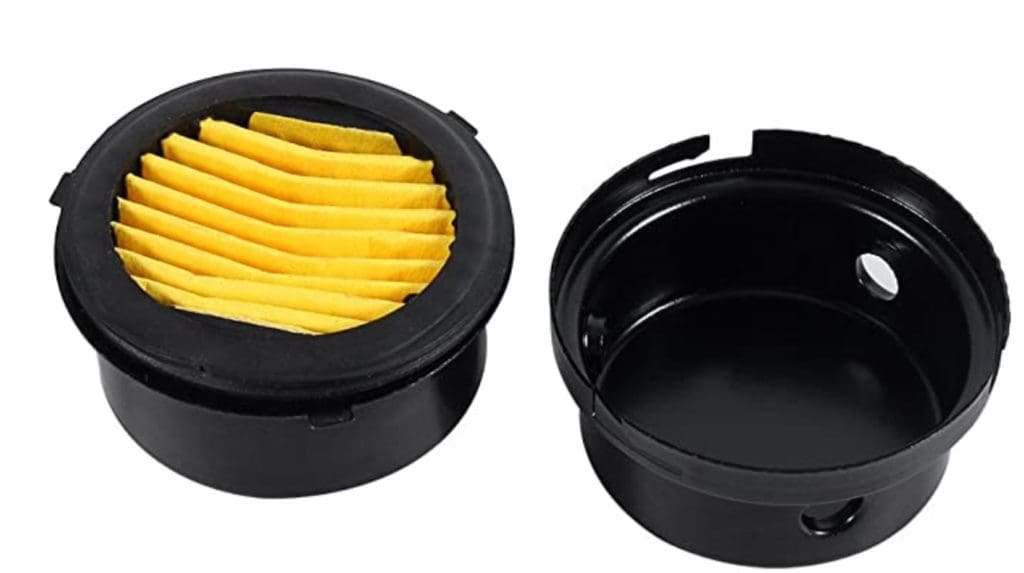
Often the noise doesn’t come from the compressor body itself, but from the intake vent. You can also use a muffler to cover your air compressor intake and reduce the noise of the compressor. Mufflers are an easy upgrade since they generally screw into the existing port. Generally, you will need a standard size of 3/8″ or 1/2 ” NPT.
These mufflers are so affordable. Heck, they generally come in a two-pack and include extra baffles.
All you do is screw it in at the air intake and you instantly have a quieter compressor.
When combined with the other tactics on this list, this air intake component can really reduce the noise.
Move The Air Intake
The air intake is a big source of the noise of an air compressor. The air intake has to be open to outside air, and this creates a free noise exchange with the surrounding environment.
A great hack is to pipe the air intake outside of the building. Since most of these compressors use a standard 2/8″ or 1/2″ threading, a standard pneumatic air hose can be attached. Then a muffler can be attached to the other end, and the entire apparatus is set a long way from the working environment.
This clever hack can help cut some of the noise if you have cranky customers during a home remodelling project who keep complaining about the air compressor noise.
Fit Rubber Grommets On The Motor
One of the workable ways of reducing air compressor noise is to use rubber. Rubbers have sound-absorbing features that make it easy to silence an air compressor. I’ll recommend going for a rubber grommet.
Rubber grommets can be used for the air compressor feet to isolate vibrations.
Noise-isolating rubber grommets for air compressors are quite affordable and can be bought at Amazon or Harbor Freight. They also are pretty universally sized.
Sometimes you need longer screws to accommodate the added thickness. In those cases, I like to go to my local MFA or Ace hardware store to buy the longer bolts locally.
Keep The Oil Changed And Topped Off
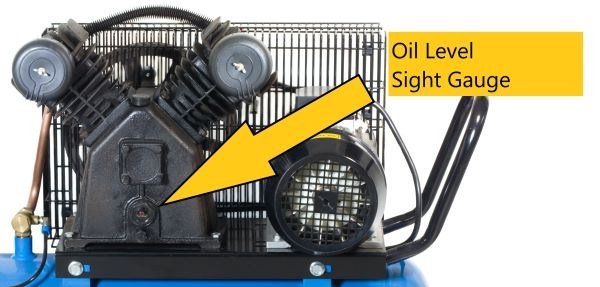
Oil-filled compressors get louder when their oil level gets too low. You want to keep the compressor oil changed and make sure that it is topped off.
When you drain the compressor at the end of each day, just check the oil site bulb to make sure that the oil is high enough.
Compressor oil is cheap and easy to change.
Tighten Loose Screws
An air compressor can rattle loose the bolts and screws that hold it together. This is one reason why pancake compressors tend to be welded together, and it is expected that you throw it away at the end of it’s life.
Often, on older compressors, a loose bolt can make a lot of noise, and creates unnecessary vibrations. Tightening these loose bolts can help quiet your air compressor
Buy A New, Quiet Air Compressor
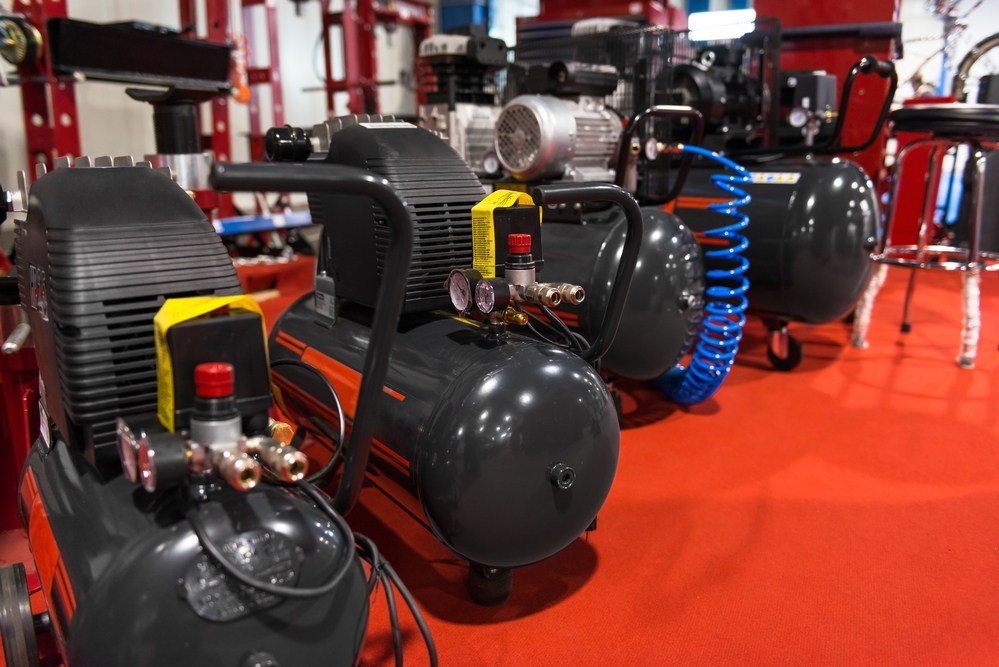
If you have a Dentist’s office, you need to bite the bullet and buy a professional air compressor that is quiet enough to represent your office.
However, for those of us who want a quieter working experience for running our pneumatic tools, nail guns and impact wrenches, there are a lot of easy and cheap options for cutting down on the compressor noise.
Considering that there are many other loud noises in a shop that can damage your hearing, it makes sense to cut down on the noise pollution where you can. You might as well save your hearing in the long run.
From covering the compressor motor to changing the air intake position, and adding a rubber grommet to the motor, there are lots of ways to silence an air compressor.
Alternatively, you can just get a new one. Whatever rocks your boat.
 Skip to content
Skip to content

